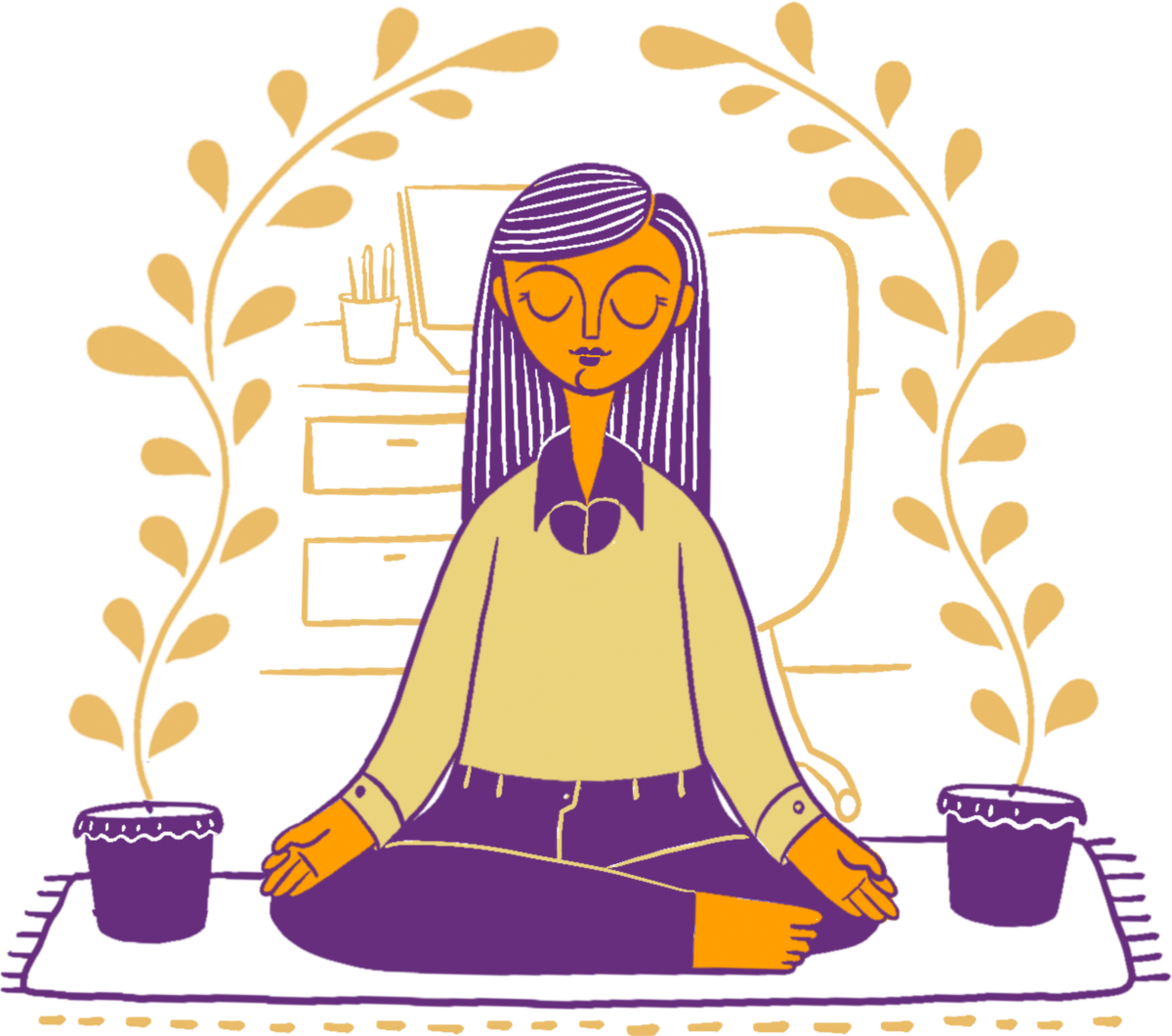11 tips to manage anxiety in your workplace

After home, our workplaces consume most of our time. While some might enjoy this, others struggle to cope, and inevitably, once in a while, all of us feel overwhelmed and just want to go home. In this article, you will learn to manage workplace anxiety.
But first, what is workplace anxiety?
Workplace anxiety is ‘occupational’ in nature, and tied closely to one’s work and workplace. An individual may experience fear, dread, or nervousness at work while working from home, or even by thinking about work!
While workplace anxiety is rooted in genuine concern - “I cannot afford to quit my job, I have a loan to pay off and a family to feed,” it is a heightened reaction born of catastrophic thoughts that the mind magnifies. Ultimately, it can lead to burnout, which according to the WHO is a syndrome “resulting from chronic workplace stress that has not been successfully managed.”
Signs you have workplace anxiety:
- nervousness
- need for perfection
- constantly evaluating if your performance was ‘good enough’
- hyper-focusing on mistakes and believing your colleagues to be judging you harshly.
- physical symptoms include sweaty palms, shivering, dryness of mouth, difficulty
breathing, tightness in the chest, and inability to think clearly.
What can you do to cope?
#1 Own your space
Do you sit in a cubicle at your workplace? Or perhaps you have an office of your
own? However big or small the space, this is your space within the organization, and you should make it as calm and comfortable as possible. Of course, you cannot sneak in your couch, but here’s what you can do:
- Decorate with visuals that help you relax
- Paste affirmations
- Put up reminders to drink water, take a break, and breathe.
#2 Healthy boundaries and your golden word ‘no’
There is no substitute for healthy boundaries. Workplace boundaries are essential
because it is impossible to function at your best without them.
- If you have reached your limit, politely decline extra work, or talk about how you can prioritize tasks.
- Alternatively, you could ask for guidance from a senior and share the work-
load with them. - You do not owe your colleagues your personal life. If you would rather not
talk about your vacation to Goa, answer briefly and ask about their vacation
instead. People love talking about themselves. - If a colleague insists on favors outside work, politely let them know it is not
within your capacity to affect anything outside the work environment.
#3 Make the most of your lunch hour
Your lunch hour is your ‘happy hour,’ your time to recharge, mentally and physically. If you would rather watch Netflix, read a book, or take a walk than have lunch with your colleagues, go for it!
#4 Do not compromise on nutrition and hydration
Take a break. To recharge, if you have to choose between a salad or a Kit Kat, think about this. Processed food might give you instant gratification, but will leave you feeling worse after the initial sugar rush wears off. Eating nutritious food, and staying hydrated will make you feel full, reduce irritability and fatigue, and help you to operate from a place of self-care.
#5 Socialise and form relationships during events
Most workplaces hold potluck dinners, Secret Santa, and team picnics. Take these as opportunities to socialize and form genuine relationships with your peers and seniors. These relationships could come in handy on work days.
#6 Use tact and diplomacy
Suppose your organization is organizing Secret Santa. You and your colleagues are asked to pitch in. You don’t want to, but instead of stepping back, you step up. But here’s the catch - you pick the most fun job, like setting up the Christmas tree. Now that’s tact!
#7 Work-life balance
Think of work-life balance as an attitude. When you’re at work, operate from this
perspective. This could include setting healthy boundaries with peers and seniors
while forming meaningful relationships outside of work.
#8 Accept the good
Many organizations offer mental health leave, emotional helplines, counseling services, and wellbeing programs to employees. Do not hesitate to avail these benefits.
#9 Take breaks
Work-life is not a race, it's a marathon where the slow and steady win. Take regular breaks, close your eyes, relax your muscles, and breathe deeply. Take regular water breaks to dismiss all-or-nothing thoughts and clear your head.
#10 Avoid catastrophizing over honest mistakes
Everybody makes mistakes. An innocent, honest mistake that doesn't impact anyone will cost you nothing. No matter how silly, the slip of the tongue during your presentation will not be remembered.
#11 Grounding
If you feel panicky, use all your senses to bring you in touch with the present moment. In your mind, name 5 things in your surroundings that you see, 4 noises, 3 things you can touch, 2 you can taste, and 1 smell. While these tips may not completely cure your anxiety, they will help you to cope. If your
anxiety persists, it's best to seek help from a professional.
We, at Manah Wellness, offer a whole range of wellbeing services right from
- confidential counseling services
- resources to educate yourself on improving your wellbeing
- tools to get you started
- a 24/7 emotional helpline
- monthly wellbeing webinars
- a special experiential learning program for training employees in emotional first-aid, and
- an expert-curated AI application, Manahverse, for them to access all things wellbeing wherever they are, whenever they want.
We're known for our super-short response rates, comprehensive solutions, wellness-centric interventions, and a foundation of trust.
If you'd like a professional's help in wading through anxiety at work, get in touch with us here.
